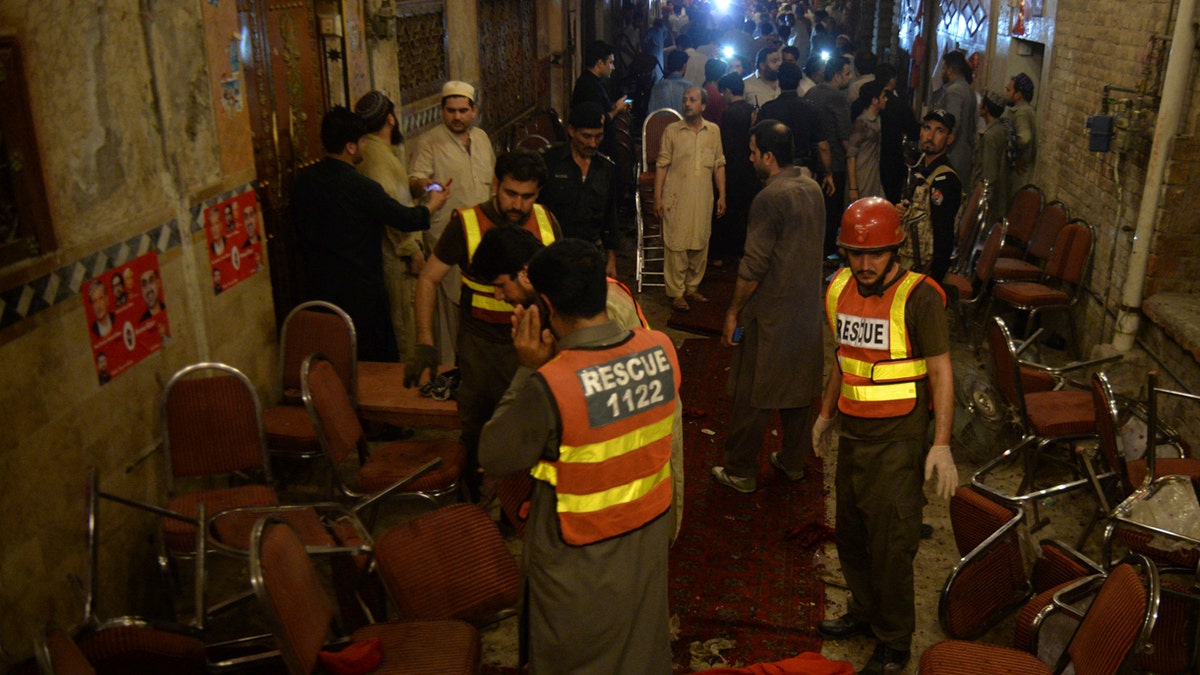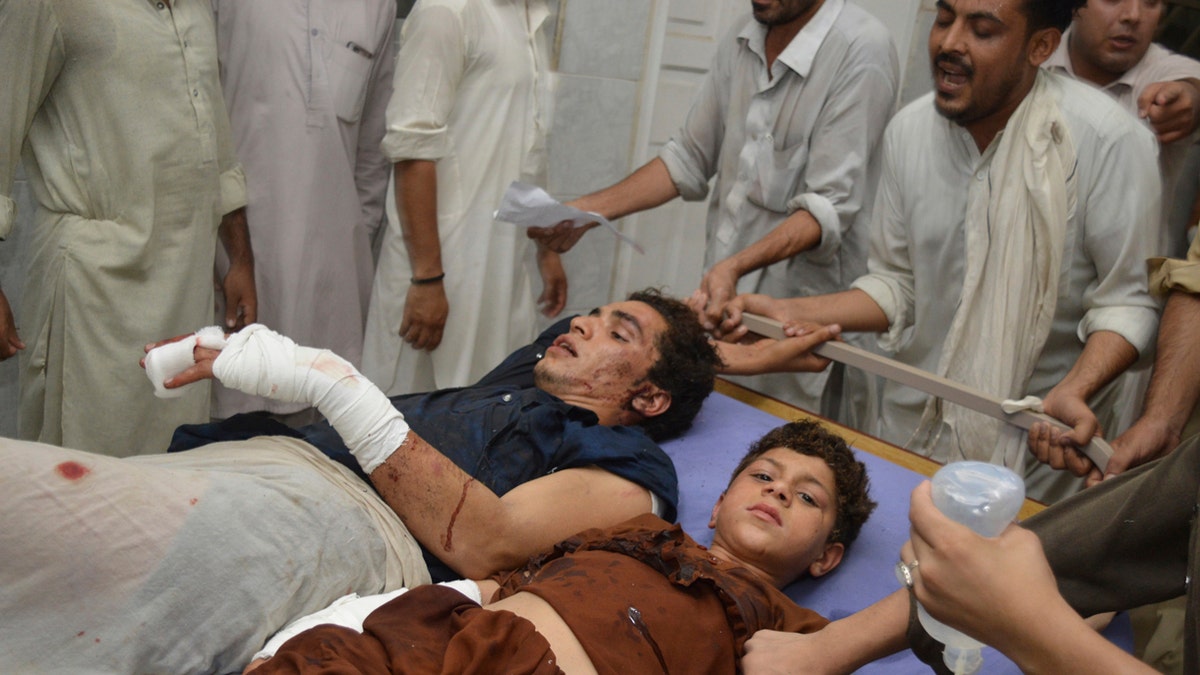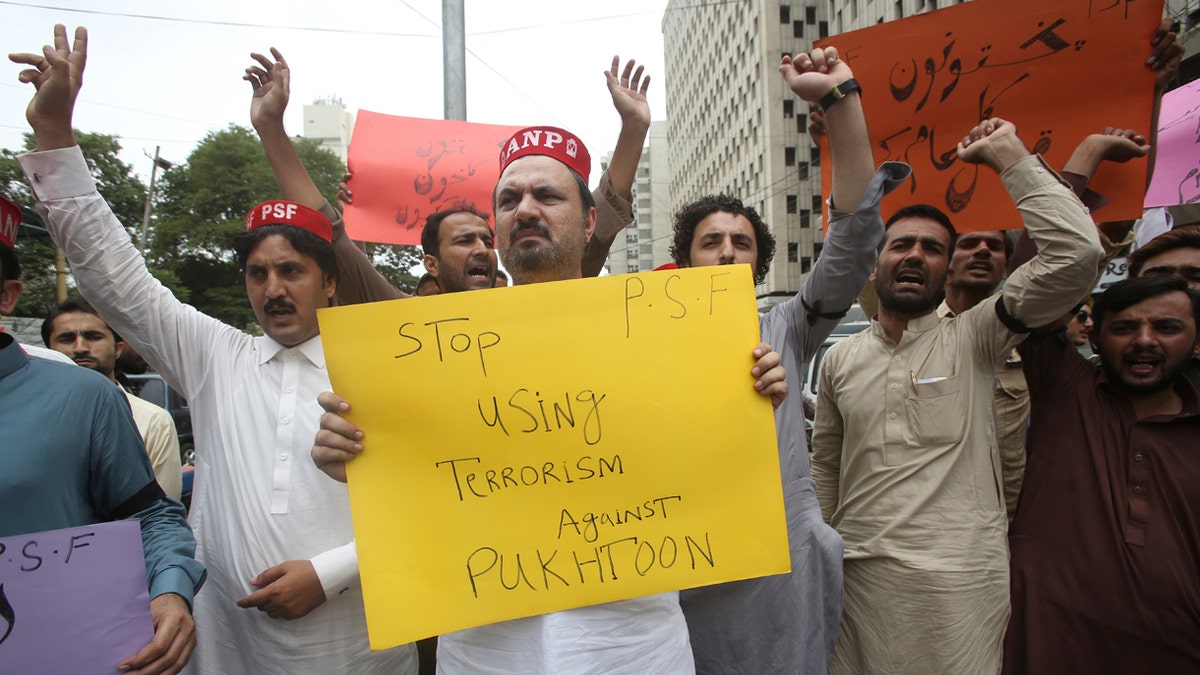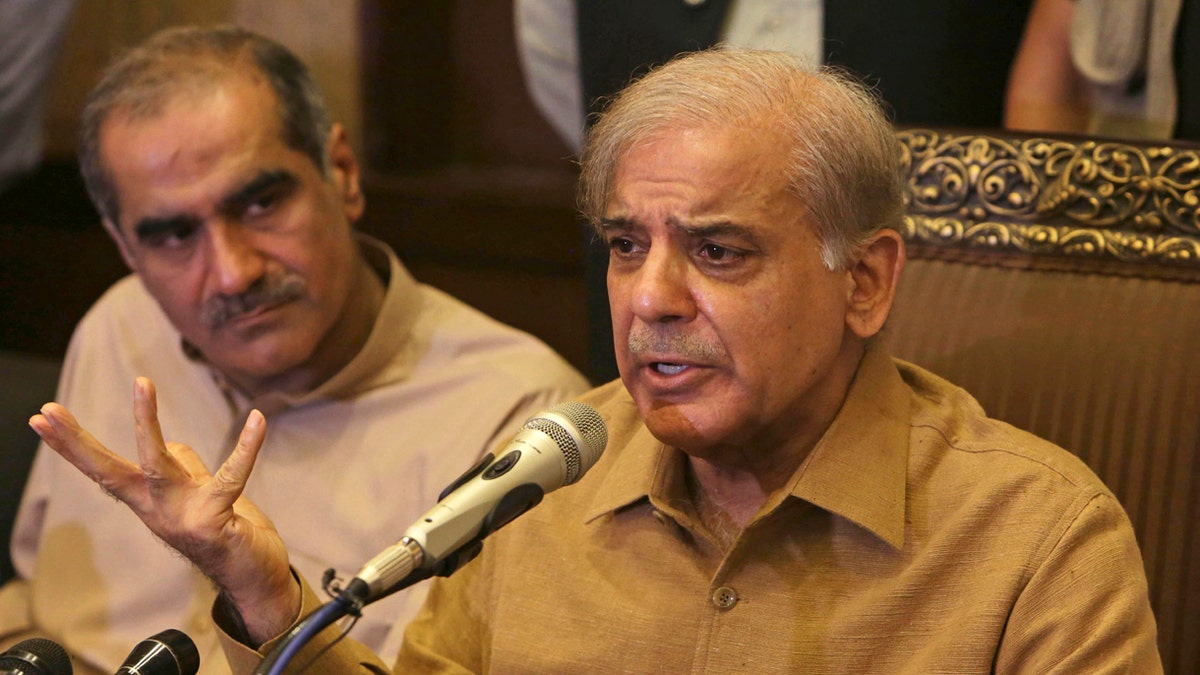
Pakistani rescue volunteers visit at a site of blast in Peshawar, Pakistan, Tuesday, July 10, 2018. Police in Pakistan say a suicide bomber has killed a secular party leader and many supporters during an election rally in the northwestern city of Peshawar. (AP Photo/Muhammad Sajjad) (AP Photo/Muhammad Sajjad)
LAHORE, Pakistan (AP) — The deadliest attack in Pakistan's troubled election campaign killed 70 people, including a candidate, in southwestern Baluchistan province on Friday ahead of disgraced former Prime Minister Nawaz Sharif's return to Pakistan.
Sharif returned late Friday from London along with his daughter Mariam to face a 10-year prison sentence on corruption charges, anti-corruption officials said. Mariam Sharif faces seven years in jail.
In the southwestern Baluchistan town of Mastung, Siraj Raisani a candidate in the provincial Parliament, died when a suicide bomber blew himself up amid scores of supporters who had gathered at a rally.

Pakistani blast victims rest at a hospital in Peshawar, Pakistan, Tuesday, July 10, 2018. Police in Pakistan say a suicide bomber has killed a secular party leader and many supporters during an election rally in the northwestern city of Peshawar. (AP Photo/Muhammad Sajjad)
Raisani is the brother of the former Baluchistan chief minister, Aslam Raisani. Caretaker Home Minister Agha Umar Bungalzai told The Associated Press another 120 people were wounded in Friday's bombing.
It was the second election-related violence to occur on Friday.

Supporters of the Pakistani secular Awami National Party condemn the Tuesday night suicide attack at their election rally, in Karachi, Pakistan, Thursday, July 12, 2018. The Pakistani Taliban claimed responsibility for the bombing at the rally that killed a secular politician and 20 others two weeks before nationwide elections. (AP Photo/Fareed Khan)
Meanwhile, Sharif arrived in the eastern city of Lahore from London where he was visiting his ailing wife when a Pakistani court convicted him and his daughter of corruption.
Sharif is expected to appeal his conviction and seek bail.
Sharif's son-in-law is currently serving his one-year prison sentence on the same charge, which stems from the purchase of luxury apartments in Britain that the court said were bought with illegally acquired money.
Ahead of his return, police swept through Lahore, arresting scores of Sharif's Pakistan Muslim League party workers to prevent them from greeting him at the airport.
Barbed wire was strung across some roads leading to the Lahore airport on Friday and barricades were positioned at the roadside ready to close off main boulevards should crowds start to gather.

Shahbaz Sharif, brother of Pakistan's former Prime Minister Nawaz Sharif, who now heads the Pakistan Muslim League, addresses a news conference in Lahore, Pakistan, Thursday, July 12, 2018. Shahbaz Sharif condemned the arrests of their supporters, demanded they stop and that everyone detained be immediately released. He told reporters in Lahore that he plans to be at "the rally tomorrow to welcome Nawaz Sharif who is returning home with his daughter." (AP Photo/K.M. Chaudary)
In a video message Friday reportedly from aboard his aircraft en route to Pakistan, Sharif said he was returning knowing he would be taken directly to prison.
Sharif has been banned from participating in politics, and his brother Shahbaz Sharif now heads his Pakistan Muslim League and is campaigning for re-election on July 25.
In a televised appeal to supporters from London earlier this week, Sharif said he was not afraid of prison and asked people to vote for his party. He also used the opportunity to again criticize Pakistan's powerful military, which has ruled the country directly or indirectly for most of its 71-year history, saying Pakistan now has a "state above the state."
During his term in office, Sharif criticized the military's involvement in civilian affairs and its efforts in fighting extremists.
Pakistani and international rights groups have accused the military of seeking to maintain its influence in Pakistani politics by keeping Sharif out of power. The military denied the accusations saying their assistance in carrying out the elections was requested by Pakistan's Election Commission. The army will deploy 350,000 security personnel to polling stations throughout the country on election day.
Underscoring the security threat, were Friday's bombings that killed 69 people in the latest election related violence. The first bomb that killed four people exploded in the northwest near the election rally of a senior politician from an Islamist party who is running for parliament from the northwestern town of Bannu.
The explosion targeted candidate Akram Khan Durrani, who escaped unhurt, and wounded 20 people, said local police chief Rashid Khan.
Durrani is running in the July 25 vote against popular former lawmaker Imran Khan. He is a candidate of Muttahida Majlis-e-Amal, an election alliance of radical religious groups.
The second explosion was in southwestern Baluchistan province, that killed 65 people and critically wounded the candidate.
Another 45 people were hurt in the attack in Mastung, a town in southwest Baluchistan province.
No one claimed responsibility for either bombing, but the attacks came days after a suicide bomber dispatched by the Pakistani Taliban killed secular politician Haroon Ahmed Bilour and 20 others at his rally in the northwestern city of Peshawar.
Former lawmaker Imran Khan, who hopes to become the next prime minister, condemned Friday's attack against his opponent, Durrani. In a tweet, he said there seems to be a conspiracy to sabotage the July 25 vote. But he said the people of Pakistan will not allow anything to prevent "historic" elections from taking place.
___
Sattar reported from Quetta, Pakistan and Associated Press writers Riaz Khan in Peshawar and Munir Ahmed and Kathy Gannon in Islamabad contributed to this report.
